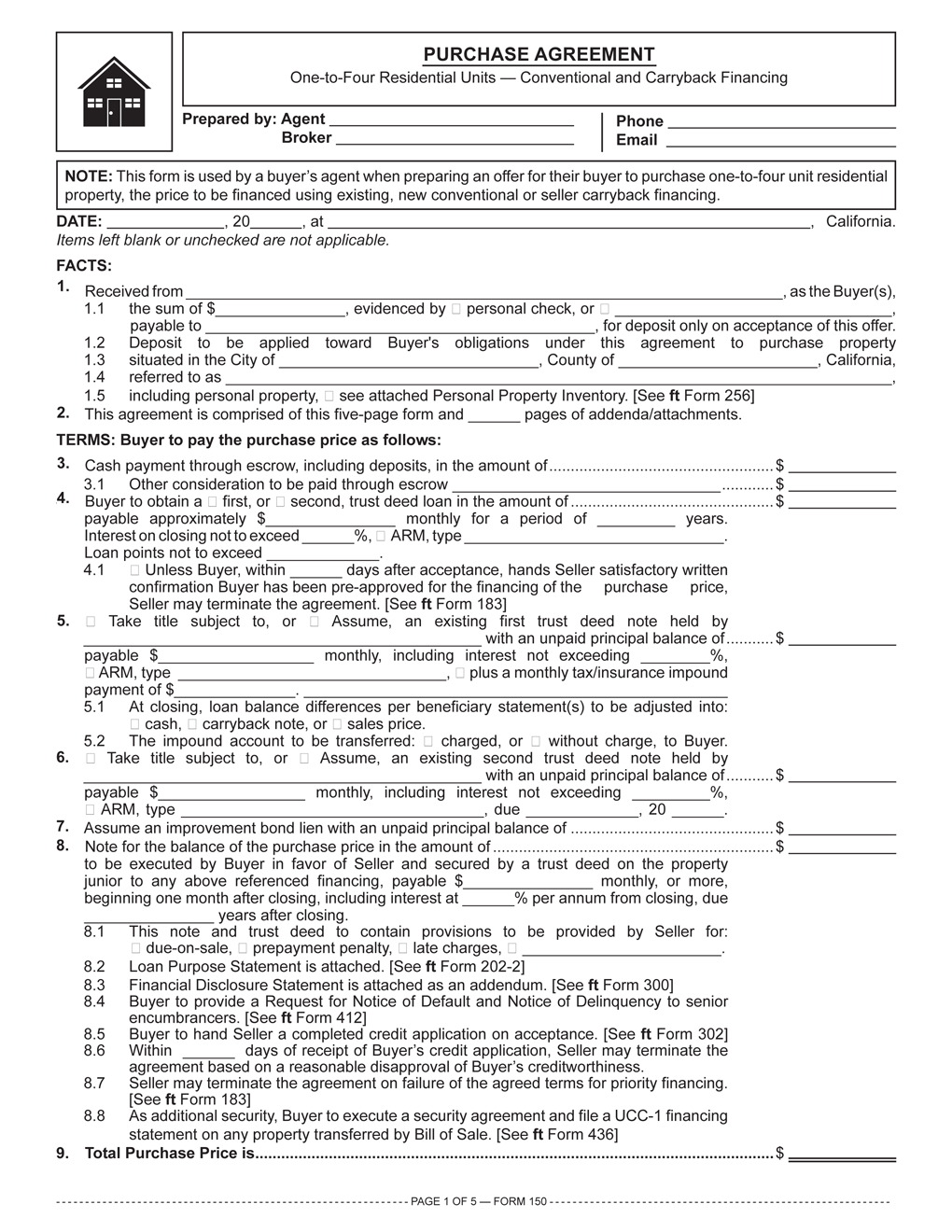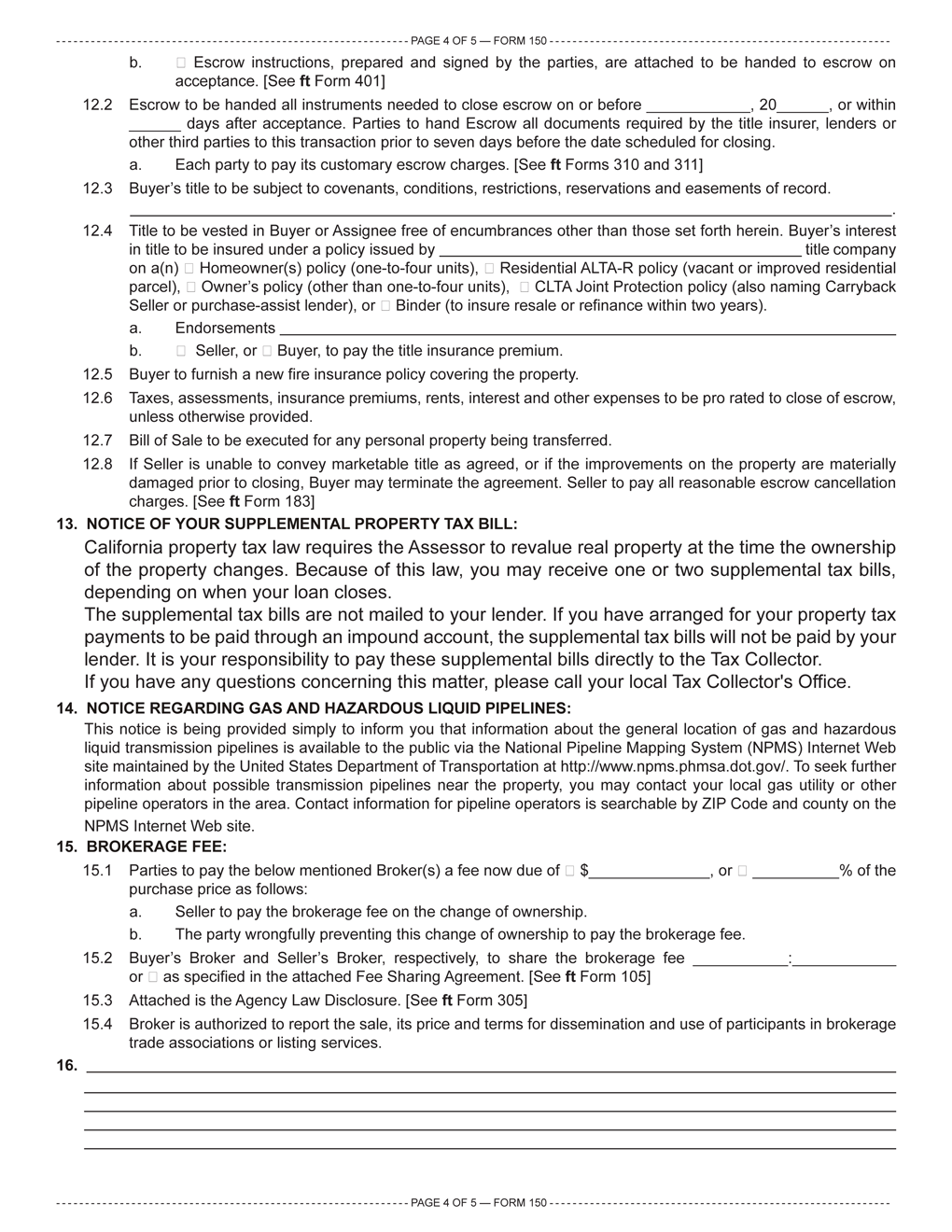Form-of-the-week: Purchase Agreement (One-to-Four Residential Units – Conventional and Carryback Financing) – Form 150
For real estate transactions conveying fee ownership of a property, the primary document a buyer’s agent uses to negotiate their buyer’s acquisition of a property is a purchase agreement form. [See first tuesday Form 150-159]
The use of different varieties of purchase agreements is required for different types of properties and financing arrangements. The various purchase agreements comprise provisions necessary for the buyer’s agent to successfully negotiate the purchase of a particular type of property.
Three basic categories of purchase agreements exist to formalize real estate transactions. The categories are influenced primarily by legislation and court decisions addressing the handling by the seller’s agent of the disclosures and due diligence investigations required to market properties.
The three categories of purchase agreements are for:
- one-to-four unit residential property acquisitions [See first tuesday Form 150 – 153 and 155 – 157];
- other than one-to-four unit residential property acquisitions, such as for income-producing properties and owner-occupied business/farming properties [See first tuesday Form 154, 158-1 and 159]; and
- land acquisitions. [See first tuesday Form 158]
Within each category of purchase agreements, several variations exist. The variations cater to the specialized use of a property, the diverse arrangements for payment of the price, property conditions which affect value, and to loan discount approvals through a short sale with greater emphasis within the one-to-four unit residential property category.
Analyzing the purchase agreement
Purchase agreements are a document used by buyers. Sellers and seller’s agents rarely use purchase agreements other than to accept a buyer’s offer. Seldom do they fill them out themselves, unless in the instance of a counteroffer. Thus, a buyer’s agent uses the first tuesday’s Purchase Agreement (One-to-Four Residential Units – Conventional and Carryback Financing) to prepare and submit the buyer’s written offer to purchase a one-to-four unit residential property to a seller and seller’s agent.
The pricing and terms for performance are limited to conventional financing, a takeover of existing mortgages and a carryback note or a combination of some of these arrangements. This purchase agreement is also properly used by sellers and their agents when confronted with a counteroffer situation. Used as a counteroffer, the seller’s agent prepares an entirely new purchase agreement, then submits it as their fresh offer to sell on terms different from those of an unacceptable purchase offer submitted by the buyer.
On acceptance, the purchase agreement becomes a binding written contract between the buyer and seller. To be enforceable, the price and terms for performance need to be clearly worded, concise and complete to prevent misunderstandings. To this end, first tuesday’s purchase agreement is a comprehensive “boilerplate” purchase agreement. It is designed as a checklist to avoid malpractice claims, containing all the provisions the buyer and their agent are to consider when preparing an offer. The various conventional financing arrangements and conditions a prudent buyer considers when making an offer to purchase are tightly worded for easy selection. [See first tuesday Form 150]
Components of the purchase agreement
Each Section of Form 150 has a separate purpose and need for enforcement. The segments include:
- Identification: The date and place of preparation for referencing the agreement, the name of the buyer, the amount of any good-faith deposit, a description of the real estate, an inventory of any personal property included in the transfer and the number of pages contained in the agreement and its addenda are set out as FACTS in Sections 1 and 2.
- Price and terms: Variations for payment of the price by cash, conventional purchase-assist financing or a takeover of existing financing and carryback financing are set out as TERMS in Sections 3 through 9, a checklist of provisions to consider. Terms are selected by checking boxes and filling blanks as desired.
- Acceptance and performance: The period for acceptance to form a contract, broker’s authorization to extend escrow, cancellation procedures, financing and the sale of other property closing contingencies, Internal Revenue Code (IRC) §1031 cooperation and liability limitations are set out in Section 10.
- Property Conditions: The buyer’s confirmation of the physical condition of the property as disclosed prior to acceptance is confirmed by the seller’s delivery of reports, warranty policies, certifications, disclosure statements, an environmental, lead-based paint and earthquake safety booklet, any property operating cost and income statements, and any homeowners’ association (HOA) documents not handed to the buyer prior to entry into the purchase agreement, as well as by the buyer’s initial inspection (personally or by a home inspector) and final inspection at closing to confirm the seller has eliminated defects known, but not disclosed, prior to acceptance, as set out in Section 11.
- Closing conditions: The escrow holder, escrow instruction arrangements, date of closing, title conditions for insurance, hazard insurance, prorations and mortgage adjustments are set out in Section 12.
- Notice of supplemental property tax: The buyer is advised they will receive one or two supplemental property tax bills due to a change in ownership in Section 13.
- Notice regarding gas and hazardous liquid pipelines: The buyer is advised that information is available to the public regarding the location of gas and hazardous liquid transmission pipelines in Section 14.
- Brokerage and agency: Transaction data is authorized for release to trade sources, the brokerage fee is set and the delivery of the agency law disclosure to both the buyer and seller are set out in Section 15.
- Signatures: The seller and buyer bind each other to perform as agreed by signing and dating their signatures. This Section also includes the confirmation of the agency undertaken by the brokers and their agents on behalf of one or both principals to the agreement.
Observations
Providing forms with maximum risk reduction and fee protection for brokers and their agents is first tuesday’s policy for drafting real estate forms. Thus, first tuesday’s purchase agreements exclude provisions which tend to increase the risk of litigation. As a matter of good policy, provisions felt to work against the ultimate best interests of the buyer, seller and brokers are excluded.
Also, since the buyer and their agent are the ones who make and submit an offer to purchase, first tuesday’s purchase agreement is designed with the buyer in mind. Thus, the form does not favor the seller in the structuring of provisions.
Excluded provisions seen in some purchase agreements include:
- an attorney fee provision, since it promotes litigation and inhibits resolution;
- a time-essence clause, since future performance (closing) dates are estimates by the agents of the time needed to close and are improperly used by sellers in rising markets to obstruct or cancel the transaction before the buyer and brokers are able to comply with performance provisions in the agreement;
- the liquidated damages provision, since it creates wrongful expectations of windfall profits for sellers, and is an unenforceable penalty; and
- the arbitration provision, since arbitration decisions are final and unappealable without judicial oversight to assure the arbitrator’s award will be fair or correct, a disservice to the real estate industry.
first tuesday’s purchase agreement includes a mandatory mediation provision which mitigates the risk of a legal battle. Mediation of any dispute must be undertaken as a precursor to filing an action, be it arbitration or litigation. Mediation is a quick process and is the most cost effective method of dispute resolution society has developed.
Related articles:
Brokerage Reminder: first tuesday’s Purchase Agreement – fair and unbiased for all to use
Editor’s note — first tuesday publishes a wide selection of purchase agreements which cater to different types of transactions, such as short sales and commercial property acquisitions. [See first tuesday Form 150-159]




















Your form was refused, by REO Agent in Sacramento. I realize the forms are “legal”, but it puts me in a bind because I do not want to joint CAR just for the forms, however the push back is insurmountable.